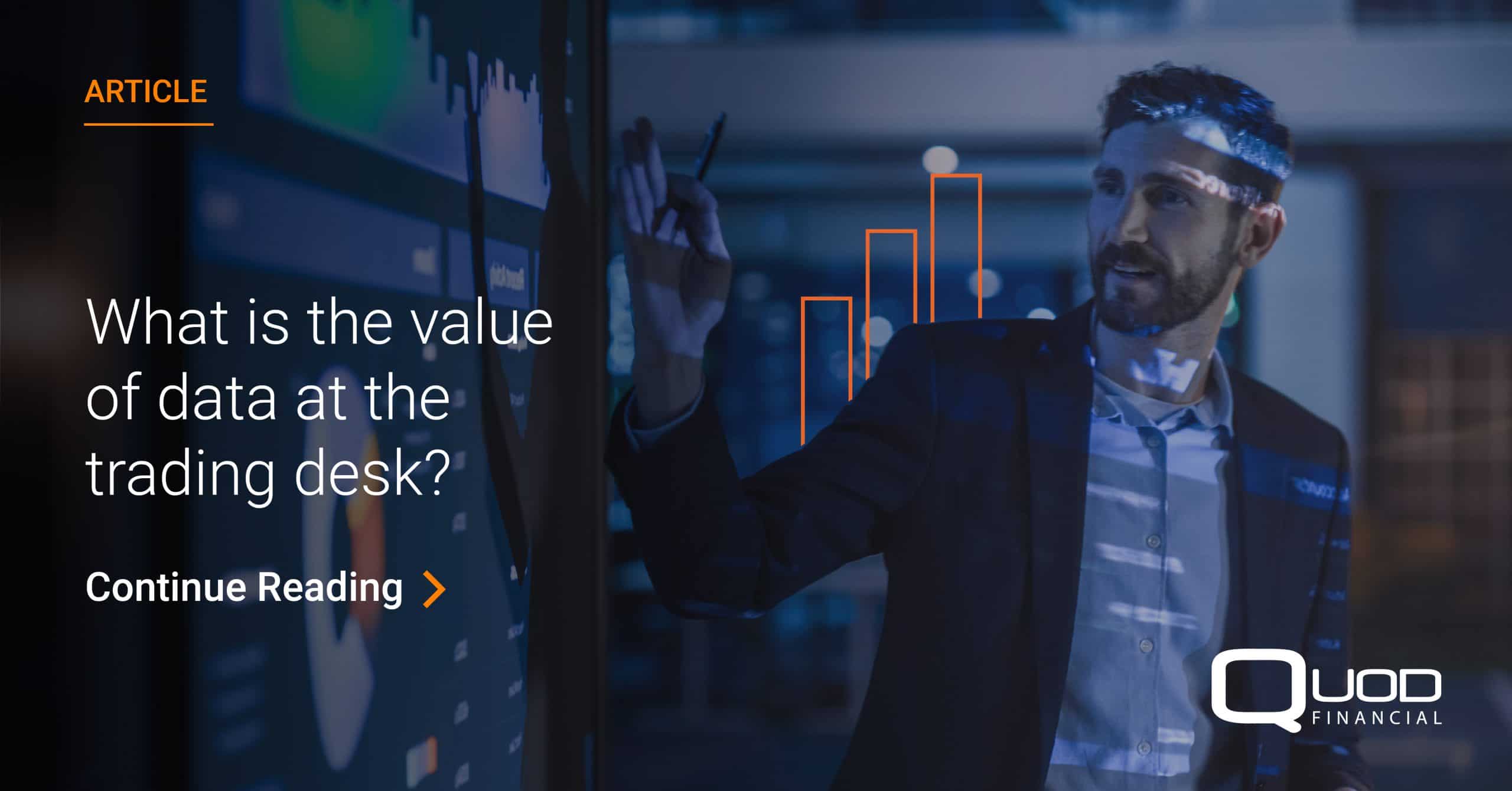
As a consequence of growing competition and emerging regulations, financial institutions increasingly look for innovative ways to meet the increase in client demands. However, with continuously inflating amounts of market data, it becomes progressively difficult to extract valuable information and actionable intelligence.
The financial services sector has been manipulating data for a great deal of time. Yet the industry has been quite unsuccessful at using that data to better execution and improve trading decisions.
With the volume of available data, a need for tools has emerged to manipulate it in a more efficient way. The use of Big Data techniques such as Machine Learning, enables educated decision-making for our clients that increase in value as more data is gathered over time.
Historically, many decisions taken by traders have relied on subjective expertise, which is influenced by individual bias and emotion. Today, data eliminates that problem, offering more transparency in trading decisions.
“There is visibility on many open projects, government information, which allows everyone in the wider community to be a judge. I think that this is where trading is going. Transparency will require justification to the clients on why a trader took a decision under specific market conditions. Tools such as Transaction Cost Analysis come in useful, enabling insight into the impact that an order had on the market, but also help in improving future trading decisions.” – Mickael Rouillere, Chief Data Science Officer at Quod Financial.
The Impact of Machine Learning
Originating in mathematical modelling of neural networks, the theory behind Machine Learning has been around for over 40 years. The availability of computational power as well as huge libraries of software models, allow practical applications of these techniques in production systems.
Machine Learning itself enables the manipulation of data and solves the challenges around its exponential growth. Humans do not possess the ability to access and analyse all available data sets, where ML helps us make sense of the contemporary mass of data collected everywhere. Today, we are seeing the first benefits of machine learning both in algos and automated trading, as well as at the high-touch trading desk.
To exemplify, Machine Learning is revolutionising Transaction Cost Analysis (TCA). Generated to aid traders in the analysis of trade performance, the report often becomes difficult to translate into meaningful actions. But today, ML enables creation of a real-time loop to feedback TCA outcomes to a pre-trade strategy selection.
Find out more on TCA automation.
“In the past 5-6 years we have seen a movement in the trading community, as many traders come to a realisation that TCA is now an inherent part of contemporary trading. You cannot manage what you cannot measure – and TCA is about measuring the quality of a trade performance.” – Mickael Rouillere, Chief Data Science Officer at Quod Financial.
Harnessing big data to improve decision-making
Data Science teams across the industry are adopting advanced Big Data technologies that allow them to analyse high-volume data and uncover hidden patterns and opportunities.
“The more data is available – the better algorithms become. The richer the data – the better decisions. Machine Learning and Artificial Intelligence are bringing new capabilities to the domain of computer science. What used to be just an excel spreadsheet five years ago, today is an immersive platform utilising cutting edge technology, and providing real-time recommendations to the users.” – Mickael Rouillere, Chief Data Science Officer at Quod Financial.
At Quod Financial, the data science team is dedicated to implementing the newest research advances in the field of Machine Learning. Some of the most recent use cases include the application of ML for; Volume and Price variation prediction used to improve intra-day curves and midpoint predictions; Instrument Clustering used to simplify instrument sets for predictions and improve trade performance with limited instrument history; Pre-trade Parameter Optimisation using historic TCA to assist with the configuration of individual strategies.
Financial Services data is highly focused around finding trends in time-series data. Examples are the evolution of Spread, Hit-Ratio or Fill-ratios over time. These trends are well suited to ML and provide rapid improvement over current practices for monitoring large numbers of characteristics in multiple instruments / asset classes as well as detecting them much earlier than the current techniques.
By data crunching and complex calculations for the front-end, Data Scientists transform historical data into a real-time stream of insight to the clients.
Continue reading: Future of Transaction Cost Analysis (TCA) and Machine Learning – Quod Financial
Until recently, traders have not been able to utilise the vast amounts of intelligence concealed in Market Data. With the application of Big Data technologies, such as Machine Learning, the industry is gaining momentum in enabling more data-driven decision making. However, the inflation of data and the strive for competitive advantage imbeds AI/ML into the future of trading.
It becomes evident that ingestion capabilities and development of ML models is where investment should be made in the upcoming years. Capturing, measuring and manipulating the continuously increasing mass of data is a key step into improving trading, both from the execution perspective, but also for the benefit of clients.
—
About Quod Financial
Quod Financial is a multi-asset OMS/EMS trading technology provider focused on automation and innovation – specialising in software and services such as Algorithmic Trading, Smart Order Routing (SOR), and Internalisation of Liquidity. Quod leverages the use of its data-driven architecture to support the demands of e-trading markets by combining AI/ML-enabled decision-making tools and dynamic market access with a non-disruptive approach to deployment. For more information visit: www.quodfinancial.com
Quod Marketing
+44 20 7997 7020
marketing@quodfinancial.com

